#1780s France
Explore tagged Tumblr posts
Text
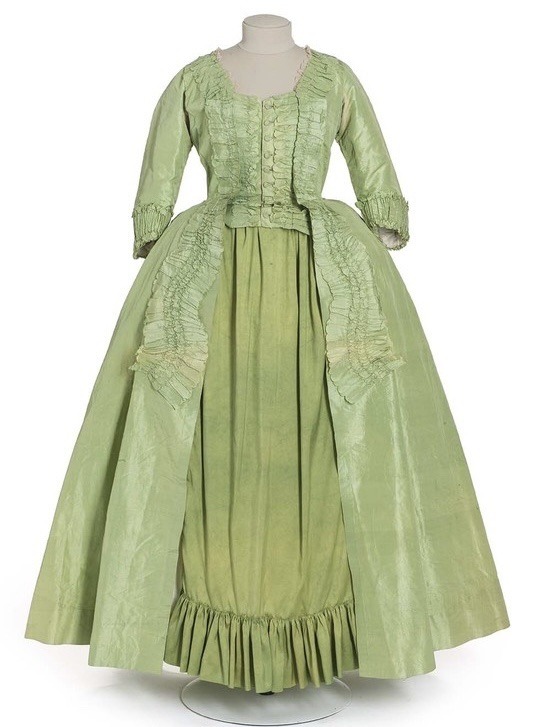

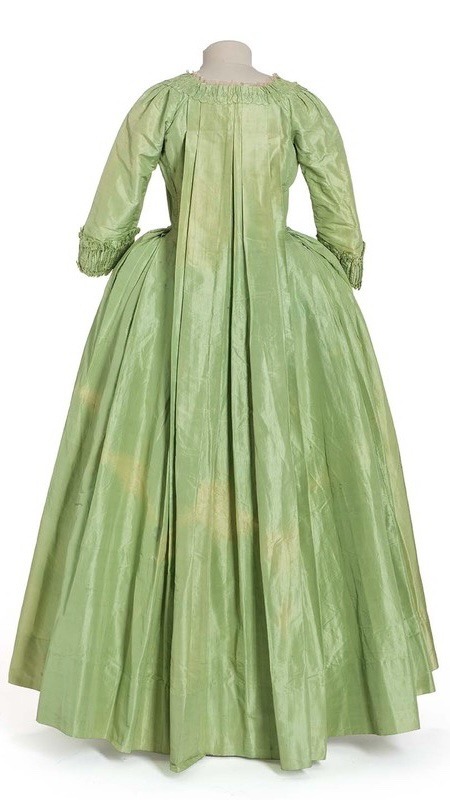
Pale Green Taffeta Dress, 1775-1785, French.
Musée des Arts Décoratifs Paris.
#womenswear#extant garments#dress#silk#green#18th century#1775#1770s#1780s#1770s dress#1780s dress#1770s france#1780s France#mad paris#musée des arts décoratifs paris#France#French#reign: louis xvi#1776#1777#1778#1779#1780#1781#1782#1783#1784#1785#1770s extant garment#1780s extant garment
274 notes
·
View notes
Text
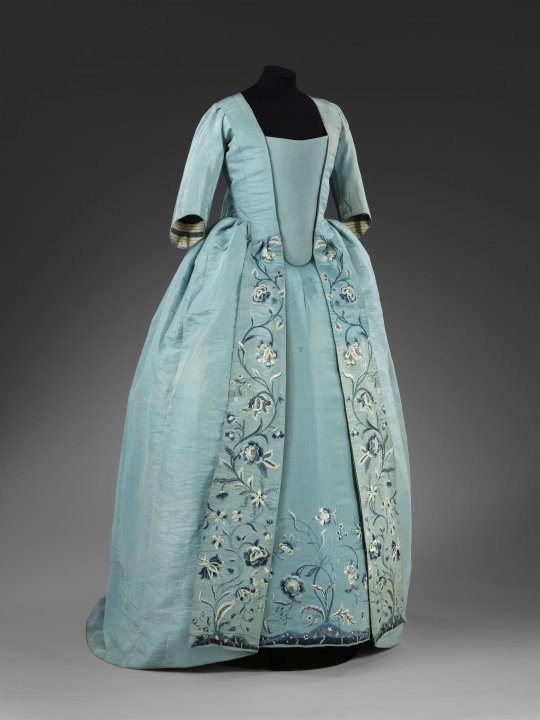

Robe à la française
1750s; Altered 1780s & Late 19th Century
France & England
The ensemble was probably made as a sack and petticoat in the 1750s. In the 1780s, the sack was updated in style. A waist seam was probably added, the skirts reconfigured, and sleeve ruffles removed. The half-stomachers were added at this time and the bodice fronts relined. The back lacing was reconfigured and more eyelets worked.
The ensemble was altered for fancy dress in the late 19th century. Hooks and eyes were added to the bodice stomacher fronts and machine-lace ruffles to the sleeves. The petticoat may have been unpicked at this point.
The petticoat was gathered onto a cotton band after acquisition for Museum display. (V&A)
Victoria & Albert Museum (Accession Number: CIRC.157-1920)
#robe a la francaise#fancy dress#fashion history#historical fashion#1750s#1780s#19th century#georgian#victorian#france#england#v and a#v and a museum#popular
1K notes
·
View notes
Text




"Portrait of a Lady", ca. 1780, François Dumont.
41 notes
·
View notes
Text
Hi all my lovely friends, here’s some photos from when I visited Versailles, and The Tomb of Emperor Napoleon I back in October 2024. I really hope to go back one day to Versailles because it was soo hot when I went and I was wearing too many layers which kind of ruined the experience.
Paris was so amazing and I fangirled so hard at Napoleon’s tomb and at Versailles. When I seen the portraits of Marie Leszczyńska and of Marie Antoinette I actually died! They are my 2 favourite French Queens.










#history#french#france#french history#french revolution#Napoleon#napoleonic era#1780s#Paris#palace of versailles#royalty#royal history#marie antoinette#Maria Antonia#Marie Leszczyńska#queens of France#queen of france
24 notes
·
View notes
Text

Portrait of a lady traditionally identified as Madame le Génerale d'Hautville by Pierre Rouvier, circa 1785
47 notes
·
View notes
Text

Vase in the Renaissance style. Bronze, hard porcelain, gilded by Alexandre-Évariste Fragonard, FRANCE (1780-1850)
#vase#jarron#beautiful#hermoso#renaissance#renacimiento#style#estilo#bronze#bronce#porcelain#porcelana#gilded#dorado#alexandre évariste fragonard#1780#1850#france#francia#europe#europa
43 notes
·
View notes
Text

'WE USED TO BE IN LOVE'
'and you actually used to be great'
#hetalia#fruk#nyo fruk#nyo england#nyo france#nyotalia#aph england#aph france#vaguely based on 1780s so independence war and shit#nyo fruk has the potential to be toxic yuri change my mind#Spotify
18 notes
·
View notes
Text
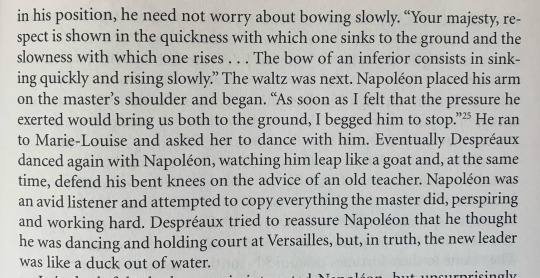
Napoleon gets dancing lessons in 1811 and he apparently leaps like a goat 🤭
#cuteeee#the dancing empire#Jean- Etienne Despréaux#Despréaux#Napoleon#napoleon bonaparte#Marie Louise#book#1811#dancing#books: The Lure of Perfection: Fashion and Ballet 1780-1830: Bennahum Judith#napoleonic era#napoleonic#first french empire#19th century#1800s#history#french empire#France#french history
54 notes
·
View notes
Text
The Chevalier d'Éon (1728-1810) was raised in France as the male heir to the Beaumont family. The decorated soldier dressed as a man to serve as a captain of Dragoons, and as a woman named Lia de Beaumont to spy for France on Russia and England. A master fencer, the Chevalier is shown here on the right in a celebrated match against Chevalier de St Georges. This was painted by Alexandre-Auguste Robineau c.1787.

"Normal Women: 900 Years of Making History" - Philippa Gregory
#book quotes#normal women#philippa gregory#nonfiction#chevalier d'eon#france#beaumont#soldier#dragoons#captain#lia de beaumont#spy#russia#england#fencing#chevalier de saint georges#alexandre auguste robineau#80s#1780s#18th century
10 notes
·
View notes
Text
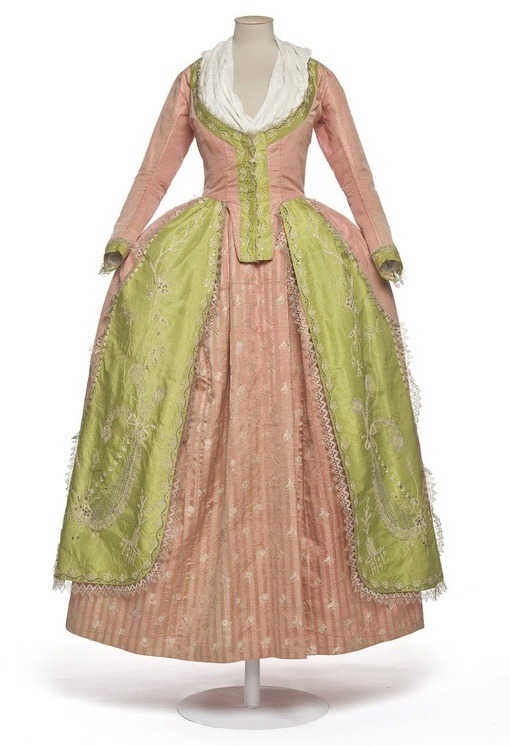


Pink and Green Robe à la Polonaise, 1780-1785, French.
Musée des Arts Décoratifs Paris.
#musée des arts décoratifs paris#mad paris#womenswear#extant garments#dress#silk#18th century#robe à la polonaise#french#France#1780s#1780s dress#1780s France#reign: louis xvi#pink#green#1780#1781#1782#1783#1784#1785#1780s extant garment
193 notes
·
View notes
Text

Planche 1, Cabinet des Modes, May 15th 1786, Bibliothèque Nationale Française.
This plate has a LONG description, and here's a (shortened) rough translation of the description:
We can say it is no longer desirable for women to dress with great adornment (...) and these fashions are no longer made but for ceremonial gatherings, weddings, formal balls, large meals, which take place in very small numbers. This justifies us to not have often representations of these garments (...), nevertheless since they re sometimes worn, we show them in plates 1 and 2. In plate 1 we can clearly see that we no longer wear the big paniers and even in the most adornment, the fashions have been simplified (except, of course, the court clothes, which do not vary much and can be traces to the clothes of our fathers) (...). The woman in Plate 1 wears a blue robe à la Turque. The petticoat is of the same fabric and colour, the sleeves are made of white gros-de-Naples or another white fabric. The trim of the dress is in white crepe in the shape of rosettes, and in the middle of each is bouquet of artificial roses. The skirt of also decorated with white crepe and rosettes similar to the dress. The cuffs attached to the sleeves are made of cut white gauze. The throat is covered with a gauze fichu, tied at the front with a rainbow ribbon bow, she wears white leather gloves, and a fan. The head is covered with a bonnet also tied with a rainbow ribbon and topped with a garland of artificial roses. The ribbon forms a large bow at the back and holds a white crepe veil that falls almost to the waist, and on top of the bonnet rises a set of feathers: two rose, two blue, one white, and one green. The hairstyle has light curls along the entire front of the head, her hair is pulled up at the back in a flat bun, and two large curls on each side fall down her length. Her shoes are blue to match the colour of the dress, and are adorned with rainbow ribbon.
I found many funny things in this description, like that the magazine writers thought in 1786 that this look was simple, the concept of rainbow ribbon (ruban à l'Arc-en-Ciel) that seems to simply be a ribbon in colourful stripes, and the size and complexity of that bonnet. How about you? Please let me know in the comments or reblog tags, what is your favorite part of this outfit, or even if you'd like to reproduce it.
Also, the plate 2, that is a men's outfit, will be posted soon :)
#18th century#18th century fashion#cabinet des modes#1780s#1786#france#womenswear#blue#blue womenswear#fashion plate
68 notes
·
View notes
Text
Being a problem doesn't just mean punching nazis in the street either! Malicious compliance, quiet rebellions like "losing" important documents, and so forth all make you a big fucking problem. Remember, it's a beautiful day in Fourth Reich Amerikkka and you are horrible goose. Go honk some shit up.

#us politics#us government#donald trump#elon musk#we're living in 1930s germany#but we can make it 1780s france if we try#be the goose you want to see in yhe world#stay strong#eat the rich
5K notes
·
View notes
Photo
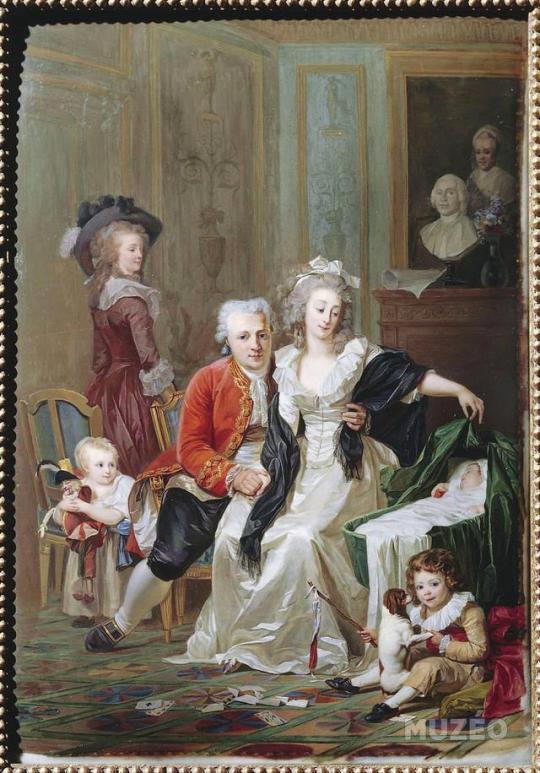
Mégret de Sérilly and his family by Jacques Thouron, 1787
70 notes
·
View notes
Text
𝐿'𝐴𝑓𝑓𝑎𝑖𝑟𝑒 𝑑𝑢 𝑐𝑜𝑙𝑙𝑖𝑒𝑟 𝑑𝑒 𝑙𝑎 𝑅𝑒𝑖𝑛𝑒
𝑐ℎ𝑟𝑜𝑛𝑖𝑐 𝑜𝑓 16/03/25

La France en 1784, sous le règne de Louis-Auguste de France alias Louis XVI, est marquée par une crise économique. Marie-Antoinette de France est au cœur d'un scandale bien qu'elle en soit innocente. Ce scandale vient entacher la réputation déjà pas fameuse de la Reine de France. Nous parlons d'un scandale car en pleine crise économique, la Reine n'est pas censée s'offrir un collier aussi monstrueusement cher, on estime un prix d'environ 2 millions de livres.
𝐿𝑒 𝑐𝑜𝑙𝑙𝑖𝑒𝑟.
Ce magnifique collier qui débute sa conception en 1772 par deux bijoutiers parisiens nommées Boehmer et Bassenge.



C'est un collier en diamant à l'origine pour le roi Louis XV de France pour couvrir de cadeaux plus somptueux les uns que les autres sa favorite Jeanne du Barry.
Lorsque les bijoutiers furent satisfait, le collier était d'une ostentation criarde, contenant 647 diamants, 2 800 carats, digne de toute maîtresse royale. Mais à la fin de cette conception, les bijoutiers furent confrontés à la nouvelle réalité. En 1792, la variole a eu raison du roi Louis XV et la principale cliente destinée pour ce collier fu exilée dans un couvent sous la demande de la femme de l'actuel roi de France Louis XVI, Marie-Antoinette.
Les bijoutiers se donnèrent une mission : celle de vendre ce collier à la reine, la plus évidente acheteuse grâce à ses gouts évidents de la mode et du luxe. Malheureusement, le collier s'avéra trop cher pour Marie-Antoinette qui, en tant que rivale acharnée de Madame Du Barry, ne l'aimait peut-être pas en raison de son association avec cette dernière, ou le trouva peut-être tout simplement trop ostentatoire à son goût. Dans un cas comme un autre, elle refusa, même lorsque Boehmer faisant appel à la faiblesse connue de la reine, il fit une scène à la cour, "sanglotant, hurlant, se pâmant et menaçant de se suicider si la reine ne lui enlevait pas le collier des mains" (Schama, 204). Mais Marie-Antoinette resta indifférente au dires du bijoutiers et déclare que la couronne française avait "plus besoin de soixante-quatorze navires de guerre que de colliers" (Carlyle, 53).
𝐿𝑒 𝐶𝑎𝑟𝑑𝑖𝑛𝑎𝑙 𝑒𝑡 𝑙'𝑒𝑠𝑐𝑟𝑜𝑐.
Au cœur de l'affaire du collier de la reine se trouve une manipulation habilement orchestrée par Jeanne de Valois-Saint-Rémy, plus connue sous le nom de Jeanne de La Motte. Issue d'une lignée illustre mais ruinée, elle ambitionne de retrouver un rang élevé au sein de la cour. Profitant des désirs du cardinal de Rohan de regagner les faveurs de Marie-Antoinette, elle lui fait croire qu'elle entretient une correspondance secrète avec la souveraine.
Le cardinal de Rohan, ancien ambassadeur de France à Vienne, rêve d'obtenir les bonnes grâces de la reine, qui le méprise profondément. Jeanne de La Motte lui fait croire que Marie-Antoinette souhaite secrètement son retour en grâce et lui suggère de prouver sa loyauté en facilitant l'achat du somptueux collier auprès des joailliers Boehmer et Bassenge. Pour rendre son stratagème plus crédible, elle organise une rencontre nocturne dans les jardins de Versailles avec une femme ressemblant à la reine, une certaine Nicole Le Guay d’Oliva, qui joue son rôle à la perfection. Convaincu de la sincérité de la démarche, Rohan accepte d'intercéder en faveur de la reine et se porte garant de la transaction auprès des joailliers.
Grâce à cette ruse, Jeanne de La Motte s’empare du collier et s’empresse de le faire démonter pour revendre les pierres précieuses. Mais l'affaire prend un tournant inattendu lorsque les joailliers réclament leur dû auprès de la cour et que Marie-Antoinette, qui n'a jamais commandé le bijou, s’indigne de cette supercherie. L’arnaque éclate au grand jour, précipitant l’arrestation du cardinal de Rohan et de ses complices. Ce scandale, qui ternit encore davantage l'image de la monarchie, devient un symbole du mécontentement populaire envers la couronne et annonce les prémices de la Révolution française.
𝐿𝑒 𝑠𝑐𝑎𝑛𝑑𝑎𝑙𝑒.
Le 15 août 1785, le Cardinal de Rohan est arrêté de façon spectaculaire dans la Galerie des Glaces, vêtu de ses habits sacerdotaux, alors qu'il s'apprête à célébrer la messe de l'Assomption. Cette arrestation publique, ordonnée par Louis XVI lui-même, marque le début d'une affaire qui va rapidement dépasser le simple cadre d'une escroquerie.
Lorsque les joailliers Böhmer et Bassenge, inquiets de ne pas recevoir leurs paiements, s'adressent directement à Marie-Antoinette pour réclamer leur dû, la reine découvre avec stupéfaction l'existence de cette transaction effectuée prétendument en son nom. Sa réaction indignée pousse le roi à agir promptement contre le Cardinal.
L'instruction judiciaire met progressivement en lumière les manipulations de la comtesse de La Motte. Les fausses lettres signées "Marie-Antoinette de France" (signature que la reine n'utilisait jamais), la rencontre nocturne dans le bosquet de Versailles avec une fausse reine incarnée par Nicole Leguay d'Oliva, et les promesses illusoires faites au Cardinal révèlent l'ampleur de la machination.
La nouvelle de l'arrestation d'un prince de l'Église et de l'implication présumée de la reine dans cette affaire de mœurs et d'argent se répand comme une traînée de poudre dans Paris, puis dans toute l'Europe. Des pamphlets et libelles circulent, alimentant les rumeurs les plus folles sur la conduite de Marie-Antoinette, déjà surnommée "l'Autrichienne" par ses détracteurs.
Le procès qui s'ouvre devant le Parlement de Paris en mai 1786 devient rapidement une affaire politique. Plus qu'un simple procès pour escroquerie, c'est la réputation de la monarchie qui est en jeu. L'opinion publique, déjà hostile à Marie-Antoinette, suit avec passion les rebondissements de cette affaire qui cristallise toutes les critiques contre la Cour et ses dépenses somptuaires en cette période de difficultés économiques.
Le scandale du Collier marque ainsi un tournant décisif dans l'image de la royauté française, entachant irrémédiablement la réputation de Marie-Antoinette et préfigurant les troubles révolutionnaires à venir.
𝐿𝑎 𝑟é𝑝𝑢𝑡𝑎𝑡𝑖𝑜𝑛 𝑎𝑔𝑔𝑟𝑎𝑣é𝑒 𝑑𝑒 𝑀𝑎𝑟𝑖𝑒-𝐴𝑛𝑡𝑜𝑖𝑛𝑒𝑡𝑡𝑒.
L'affaire du Collier porta un coup fatal à la réputation déjà fragile de Marie-Antoinette. Bien qu'innocente dans cette escroquerie, la reine sortit profondément meurtrie de ce scandale qui confirmait, aux yeux de l'opinion publique, tous les préjugés circulant à son encontre.
Avant même cette affaire, Marie-Antoinette souffrait d'une image controversée. Surnommée "l'Autrichienne" ou "Madame Déficit", elle était accusée de frivolité, de prodigalité et d'influencer négativement le roi. Son goût pour les fêtes et les parures luxueuses, bien que modéré comparé à d'autres cours européennes, était perçu comme une provocation dans un contexte de difficultés économiques grandissantes.
Le procès du Cardinal de Rohan, acquitté par le Parlement de Paris en mai 1786, fut interprété comme une humiliation pour la reine. Cette décision judiciaire semblait légitimer, aux yeux du public, l'idée qu'elle aurait pu être impliquée dans une affaire aussi sordide. L'acquittement du Cardinal fut accueilli par des acclamations populaires, témoignant de l'antipathie croissante envers la souveraine.
Les libellistes et pamphlétaires s'emparèrent avec voracité de ce nouveau scandale. Une véritable littérature diffamatoire se développa, attribuant à la reine tous les vices imaginables : débauche, adultère, homosexualité, et même inceste. Ces publications clandestines, souvent illustrées de gravures obscènes, circulaient jusque dans les campagnes, détruisant méthodiquement l'aura sacrée qui entourait traditionnellement la personne royale.
Marie-Antoinette se retira davantage à Trianon après cette affaire, cherchant refuge dans un cercle restreint de fidèles. Ce repli, interprété comme du mépris pour la cour et le peuple, ne fit qu'alimenter sa légende noire. Son influence politique auprès de Louis XVI, bien que limitée, fut diabolisée et présentée comme néfaste aux intérêts de la France.
L'historienne Simone Bertière résume parfaitement les conséquences de l'affaire : "Le procès du Collier acheva de ruiner moralement la royauté. Marie-Antoinette, déconsidérée, ne put jamais se relever de ce coup." Cette réputation détériorée constitua un terreau fertile pour les év��nements révolutionnaires qui allaient suivre, transformant progressivement la reine en symbole de tous les abus de l'Ancien Régime.
---------
All writings, images, and original content published under @madamedebellecourt are protected by intellectual property rights. Unauthorized use, reproduction, or distribution of this content without explicit permission from the original creator constitutes plagiarism and a violation of copyright laws.
#history#marie antoinette#L'AFFAIRE DU COLLIER DE LA REINE#Madame de BelleCourt#Jeanne de BelleCourt#chronic#chronicles#renaissance era#renaissance#1784#1780s#queen of france#affair of the queen's necklace
0 notes
Text
The Gazette de France, naturally, ignored the disturbance altogether. The foreign press reported it as an incident of riotous disorder, rather than suggesting any wider significance. [...] As a revolutionary event, the 1788 insurrection in Grenoble was a far more potent challenge to the ancien régime, though it scarcely now registers in the revolutionary canon. It was the newly emboldened pressmen of Paris who ensured that the storming of the Bastille did not suffer the same fate. A rush of celebratory pamphlets and illustrated broadsheets proclaimed the fall of the empty prison as the symbolic awakening of an oppressed people. [...]
The extraordinary events that unfolded in France between 1789 and 1794 were accompanied by a torrent of newsprint in every media: pamphlets, journals, broadsheet images and political song. The pre-revolutionary political crisis and the calling of the Estates General had stimulated a steadily rising drum roll of political pamphlets: around 1,500 different titles in 1788 and at least 2,600 during the elections to the Estates in the first four months of 1789: a stratospheric rise compared to the four hundred or so published in the twelve years before 1787.
The carefully constructed edifice of press control established during the ancien régime, and sustained for over 150 years, now simply evaporated. While the National Assembly engaged in long and earnest debates over press freedom, events and the book trade moved on. In the years after 1789 the pampered and privileged members of the Paris Book Guild saw their world turned upside down. For the previous two centuries it had been the conscious policy of the French monarchy to concentrate the printing industry in the capital, and to favour a small number of large firms. An effective monopoly on book production for a large and prosperous population was a predictable disincentive to innovation. [...] Now, under the pressure of unprecedented events, the market of the established printing magnates simply melted away. Despite Crown efforts to support allies in the press with substantial covert subsidies, between 1789 and 1793 many of the giants of Parisian printing filed for bankruptcy.
Their place was taken by an entirely new generation, many of them booksellers, who had detected the hunger for contemporary political works. To feed this demand they now set up their own presses. From 1789 these news publishers/booksellers also began to convert their pamphlet output into periodical series. This was neither immediately nor universally successful. Only one of the pamphlets celebrating the fall of the Bastille was announced as part of a serial. Many of the newly established titles disappeared equally rapidly. [...] From four journals published in the capital in 1788, the number skyrocketed to 184 in 1789 and 335 in 1790. During the height of the revolutionary agitation, as many as 300,000 copies a day of these various publications would have been available on the streets.
#book : the invention of news#news#newspapers#pamphlet#france#europe#french revolution#18th century#1780s#1790s#industry
1 note
·
View note
